John Janaro's Blog, page 136
December 21, 2019
Agnese Turns 21 Years Old, as Christmas Draws Near
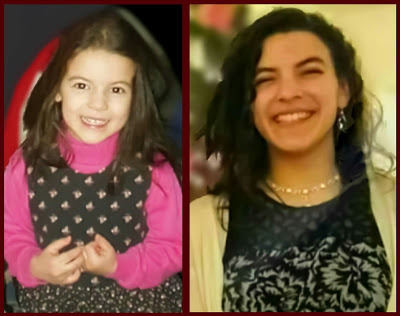 Happy Birthday Agnese Janaro. You're 21 years old now. As you know, I can't resist these "comparison collages" (age 5 on the left) but for parents they give a sweet kind of nostalgia. We're proud of the beautiful person you have grown up to be, and — of course — we're always here for you. We love you, Agnese!❤⭐ In a couple of months you will embark on what we hope will be a very special time of your university life: the Semester in Rome! You have waited a long time to go to a country where (finally) everyone will be able to pronounce your name. It will be worth the wait. The Italians make it sound like poetry!
Happy Birthday Agnese Janaro. You're 21 years old now. As you know, I can't resist these "comparison collages" (age 5 on the left) but for parents they give a sweet kind of nostalgia. We're proud of the beautiful person you have grown up to be, and — of course — we're always here for you. We love you, Agnese!❤⭐ In a couple of months you will embark on what we hope will be a very special time of your university life: the Semester in Rome! You have waited a long time to go to a country where (finally) everyone will be able to pronounce your name. It will be worth the wait. The Italians make it sound like poetry!Readers of this Blog may have noticed that, for the Janaro family, this decade has been about "kids growing up."
I think some of my bios in the publishing and internet world still say that we have "five children"! That status needs to be updated. It needs to say, "We are the parents of five..." or some such thing. Teresa and Jojo are still kids, even though Teresa drives her own Ford Explorer SUV around, and rides and takes care of her own horse. Jojo is certainly in no rush to grow up, and still enjoys being a child. Adolescence is just beginning for her.
We had five children until pretty recently, like ... you know, 2010? My "most recent" book Never Give Up: My Life and God's Mercy came out at the beginning of this decade (order it here by clicking this link — people do still buy it, read it, and find it helpful; and I'm grateful for that). The reflections in it remain pertinent. My health is, perhaps, a bit better now. One big difference, however, is that "the kids" are no longer aged 12, 11, 9, 7, and 3.
They are now 22, 21, 19, 17, and 13. For the "kids," this decade has been a big one. Which means it has been big for us too. I pray that the Lord will continue to bless and take care of our family and each of its members, and also the generation above us — our parents and the kids' grandparents. For them too, it has been a decade of many new challenges. My father is the first to have completed the journey of this earthly life. He passed away in April, three days shy of his 84th birthday.
Christmas is in a few days. For me it will be the first Christmas ever without Dad. Even the year I lived in Italy, we could talk on the telephone. So this is very different. Mom is recuperating slowly but steadily from her recent broken-bone injury. Temporarily, she has moved to a smaller efficiency apartment at a lovely Assisted Living place in Arlington where she can continue to receive therapy and all the care she needs at her own pace. We have begun the process leading to selling my parents' condo and selling our house, as well as looking at larger houses that would have space for Mom to come live with us.
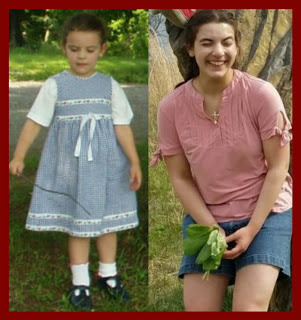 Very big things will be happening, God willing, in 2020. (A wedding too!!)
Very big things will be happening, God willing, in 2020. (A wedding too!!)But before that, Christmas approaches, and in celebrating it we remember that we are all still children, because we are children of God who has revealed Himself as our loving Father. Indeed, He sent His Son as a child to reveal the simplicity and depth of His love. I pray abundant blessings for all my readers as Christmas draws near. May its celebration bring you joy and peace.
And there's another collage of little Agnese and current Agnese (she's 3 or 4 years old on the left in this one).
Published on December 21, 2019 20:48
December 20, 2019
Key of David
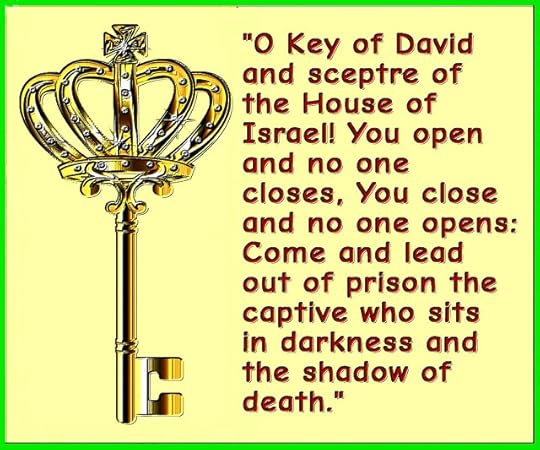
"O Key of David... Come..." It's December 20th already. The Lord is near. The Christmas Season will soon begin!
Published on December 20, 2019 15:38
December 18, 2019
We are "Saved in Hope"
 "
Are you 'saved'?
"
"
Are you 'saved'?
"When Evangelicals ask this question to faithful, devout, and well-instructed Catholic Christians, the Catholics sometimes feel like they have been "cornered." On the one hand, the question seems intent on probing whether someone who claims to be a Christian is in fact a true disciple of Jesus Christ, a believer whose life is being transformed by the grace of God. On the other hand, the question feels "loaded" (not without reason): the whole doctrinal controversy over sola fide, sola gratiae, etc. seems contained in it.
When confronted with this question — at work, school, or social events, not to mention on the street or at one's front door — Catholic Christians often don't know how to respond. We definitely want to affirm with joy the free grace of God given to us through the Cross of Jesus Christ, who has delivered us from sin and death and made us a new creation. But we also want to avoid any impression that we think the grace of Christ is a "thing" given to us "in a box" that we can stick on a shelf without heeding it further.
We want to avoid presumption; we do not want to discount the importance of free will, or the role of good works and perseverance in attaining the fullness of our promised inheritance in Christ. Not only the Council of Trent and the whole tradition, but also the New Testament require this. The ancient faith handed on from Apostolic times — the faith of the martyrs, the Church Fathers, the great saints over the course of 2000 years — embraces the mystery of salvation with a fullness and richness that correspond to a vision of Christian life as engaging and transforming the whole person. Indeed, our Evangelical brothers and sisters who really pray and meditate on the Scriptures "know" this in their hearts and live it out practically, even if some feel the need to cling to certain polemically-generated theological formulations that oversimplify or fail to do justice to the "mystical depth" (and personal depth) of the whole Christian experience.
I mean no condescension by this last statement; people's articulated adherence to different "faith-traditions" (and the statements and outlook considered essential to their historic raisons d'être) emerges from complex historical events and personal experiences, in which profound truths are often interwoven with expressions, practices, attitudes, etc, of lesser value. As Christians who desire the unity that Jesus wills for all of us, we seek to grow together through prayer and the guidance of the Holy Spirit, who continually renews and purifies us in mind and heart.
But to return to the original question: "Are we 'saved'?"
Some Evangelicals assert that "accepting Jesus Christ as my personal Savior" means that I affirm as an intellectual conviction — with absolute subjective certainty, here and now, while I am still living this earthly life, while I still follow Jesus on the arduous "narrow path" of my life's vocation — that I will definitely go to heaven when I die. They claim that what I must believe, without question, is that I am among the final elect — they say that this conviction follows from believing that the omnipotent God, through the blood of Christ, atones for all my sins and constitutes Himself as my righteousness. In their view, to imply that any actions or cooperation might be required of me, that I must "live out my faith" in order to arrive at eternal salvation, indicates something less than total confidence in (and total submission to) the power of God in Christ.
The implication is that I am not a true Christian — that I do not "really" have faith — unless I am intellectually infallibly convinced that the whole existential drama of my life and freedom is over, that my place is absolutely secure without reference to what kind of a person I might become in the future, as if the perfection of my freedom is of no concern to God and irrelevant to my identity as a child of God. This is what some Evangelicals assert conceptually and debate theologically.
Obviously this is not the Catholic Christian teaching about faith. It is also difficult to see how it can be reconciled with the multitude of exhortations (and warnings) directed at believing Christians throughout the New Testament. Indeed this debate today is carried out quite frequently among Evangelicals themselves, across a spectrum of opinions from Luther and Calvin to Arminius, Wesley, the Pentecostal movement, and other contemporary views.
It is important to realize that Evangelical Protestants argue about these (and many other) points. Being a "Bible Christian" is much more complicated than it may appear to be. What is also important, however, is the observation that sincere, practical, prayerful Evangelicals — whatever theoretical position they may hold on these classical Protestant debates — generally live their lives with a real and vital love for Christ, a passion to follow Him and do His will, a de facto sense that their actions (good or bad, virtuous or sinful) really do matter in the eyes of God, and a healthy inclination to honor those who have served the Lord courageously and faithfully.
One concern that we might identify as a motivation for the "are-you-saved?-question" is the determination to insure that all glory is given to God. The questioner may also be trying to distinguish between someone who is a real believer and a genuine committed disciple of Jesus, and someone who is just an "admirer" of Christ and holds a loose, vague ideal of Christian "humanitarianism." Too many people think that Christianity is about a distant God, a more-or-less "mythical" Christ, and a strict moral code. Evangelicals see that such a mentality betrays the Gospel. They want to propose a vital Christianity in which the saving power of God in Jesus Christ and our total dependence on Him is affirmed without ambiguity and with all the strength they deserve. And to ensure the recognition that God's power is life-changing, that it really "matters" to life right now.
Catholic Christians also want to affirm this. I don't want to pretend there are no real theoretical and practical differences here, but simply to point out that there is much we have in common.
So, ... are we "saved" by grace? Now?
"In hope we were saved. Now hope that sees for itself is not hope. For who hopes for what one sees? But if we hope for what we do not see, we wait with endurance" (Romans 8:24-25).
What is St Paul's phrase? We are "saved in hope" — and hope is a gift from God that generates a living adherence in us, the trust engendered within a relationship with Jesus. Our salvation is "within a relationship" that does exist "now." We are also empowered to live our lives within that relationship. God "saves us" by embracing us as real human persons; He embraces our whole personality, which precisely "now" is that of a free-person-living-within-history. Salvation is the work of His grace, but He does not save puppets. He saves persons, and His power is at work "inside" the life of the person, "within" the very freedom itself of the person and within the history in which possibilities for freedom — for self-giving love — continue to unfold.
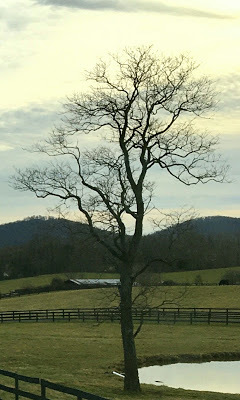 "Everything is grace..." These are the words of one of Catholic Christianity's greatest witnesses to the Gospel: Saint Thérèse of Lisieux.
"Everything is grace..." These are the words of one of Catholic Christianity's greatest witnesses to the Gospel: Saint Thérèse of Lisieux.Everything really is grace, because our Christian lives as they grow through history — and all our good works — are the fruit of grace, the grace that is transforming us and enabling us to participate in the life of God. Grace precedes, accompanies, and brings to fulfillment every good action but in a way that makes them also really "our own" acts.
God creates us as free persons, and in Christ He recreates us as redeemed persons in relationship with Himself (a "relationship" with the Trinity as children of the Father through Jesus in the Holy Spirit).
It is a "new life" in the Spirit that begins now. We are certain of Jesus Christ, of His presence in our lives, of His saving love for us. We Catholic Christians need to speak personally about Jesus as the center of life, and look at our own lives and find how this relationship shapes our lives. And if we can't find that affection for Christ — that adherence that changes the way we see reality, the way we judge things and value things — then we need to ask Him to convert our hearts and open our eyes. Dialogue with non-Catholic Christians can be an occasion to reflect more on how much we really depend — totally — on Jesus.
For me, one of the difficulties with the question "Am I 'saved'?" is that I feel like it puts the emphasis in the wrong place. It implies that in order to have confidence in God, I have to find some kind of absolute certainty inside my own narrow self-understanding, my own convictions about myself, my own subjective attitude which is so often mediated to my consciousness through a jumble of psychological issues, shifting emotions, and so many other limitations involved with being human.
Generally speaking, the only thing I feel confident about saying regarding myself is that "I am a mess!"
But I have confidence in God because of Jesus Christ.
It's not that I don't like to talk about myself. I do far too much of that. For me, this tends to come from a lack of confidence. What I know about myself is that within the next five minutes I will do something stupid.
I also know that I belong to Jesus Christ. He died on the Cross for me, He rose from the dead for me, He is my Lord, my Savior, my Redeemer, my Hope. He is the meaning of my life. I was created to belong to Him, to be His brother, and through Him to be an adopted son of the Father in the Holy Spirit.
I want to look at Jesus, and I pray for the grace to remember Jesus and trust Jesus.
Jesus is here for me and He is ever faithful. I trust in Him. I don't "see" and there is much that I need to "endure with patience," but in hope I look forward to fulfilling my personal vocation of being conformed to Jesus in the time — the "history" — given to me, and to arriving at eternal fulfillment in Him. I hope in Jesus who is my Salvation. I rejoice in that hope, even as I long to see His face, and I beg Him to remind me again when I forget. I do not seek to be either presumptuous or anxious about myself, but rather to live in relationship with Him, to press onward toward Him, trusting in Him, staying with Him, turning back to Him if I forget and wander off, always depending entirely on Him, Jesus, my Lord, my God who came into the world to save me, and who comes into the history of my life to accompany me step by step on the path to the Father's house.
I don't know if my Evangelical interlocutors would regard this as an answer to the question "Are you 'saved'?" I would be glad, however, if they recognized that I am a Christian, and that I am their brother.
[This text is a work "in progress" that will be continued....]
Published on December 18, 2019 20:58
December 17, 2019
Pope Francis Marks Anniversary and Birthday

In the past week, Pope Francis has celebrated the 50 year anniversary of his ordination and his 83rd birthday.
Sending best wishes and many, many prayers for you, Papa Francisco, as you continue to exercise the ministry the Lord has entrusted to you!
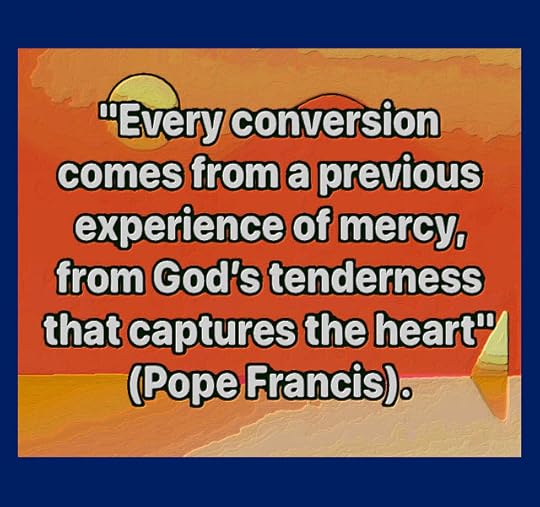
Published on December 17, 2019 19:00
December 16, 2019
Hong Kong: The Protest Goes On, the Stakes Increase
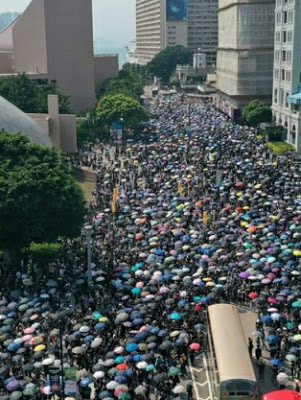 The struggle in Hong Kong has intensified dramatically since the last time I posted about it. Indeed, it has managed to keep the attention of the Western media, one reason being that (at least in the USA) it has exacerbated the problems of China's current efforts to present itself as a responsible business and trade partner.
The struggle in Hong Kong has intensified dramatically since the last time I posted about it. Indeed, it has managed to keep the attention of the Western media, one reason being that (at least in the USA) it has exacerbated the problems of China's current efforts to present itself as a responsible business and trade partner.But in the West there is also a combination of growing support, admiration, and astonishment at the perseverance of the protesters. The stubbornness of the Hong Kong government and its masters in Beijing is, by contrast, not surprising. We have begun to wonder, however, why Emperor Xi and his Brave New China have not yet "restored law and order," in classic CCP style. I don't know the Chinese term for "smash them," but it was one of Mao's favorites. Yet there has been no "smashing" in Hong Kong. Yet.
It's just possible that the mandarins of the Politburo are even more astonished than us. Perhaps they have not acted because they don't know what to do.
It's not as if the Party-state is wrestling with a bizarre and unexpected phenomenon like "a troubled conscience." Sadly, the Uighurs in western Xinjiang know only too well that New China has no humanitarian scruples. But "The Company" is in the process of negotiating multiple deals all over the world, and Hong Kong is in the global spotlight. That's rather inconvenient for the bosses in Beijing. But it may not be the only thing that perplexes them.
Hong Kong's "Revolution of Our Times" is looking more and more like an unprecedented social upheaval. Though we still try to use them, the old categories for "civil uprisings" are just not adequate to describe all that is happening. The term "police brutality" remains appropriate. As does the term "escalation," although it has a very peculiar dynamic in this case. The heat of events increases slowly (insofar as we can measure) but inexorably. The "non-lethal" force used by the police, along with the refusal of the government to show anything but contempt for the popular movement, are a kind of slow but sustained mass torture of a substantial segment of Hong Kong society. Tear gas is practically becoming part of the atmosphere people breathe every day.
On the other hand, it has become difficult to refer to the vastly diverse but still remarkably cohesive masses of people who have been taking to the streets for the past six months as "protesters" in any ordinary sense of the term. Still, I can't think of any other word for them. There are still many classical protests (such as the recent six month anniversary march that brought out nearly a million people). More and more, however, we see groups resorting to the use of force, not only in self-defense but also — in cases of vandalism and large-scale property damage — as a way to send a message to their pro-Beijing adversaries.
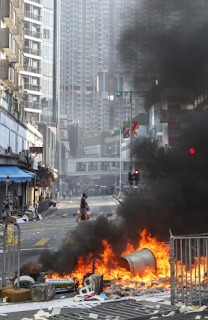 "Non-violence" has long ceased to define the movement. The use of force, however, is controlled and purposeful. People are not targets, and casualties (outside of rare rogue actions) are unintentional and infrequent. The "petrol bombs" are certainly dangerous but they are used primarily to block police advances. Property damage and spray-paint sloganeering are dramatic in their appearance (they are intended to be) but they are relatively restrained.
"Non-violence" has long ceased to define the movement. The use of force, however, is controlled and purposeful. People are not targets, and casualties (outside of rare rogue actions) are unintentional and infrequent. The "petrol bombs" are certainly dangerous but they are used primarily to block police advances. Property damage and spray-paint sloganeering are dramatic in their appearance (they are intended to be) but they are relatively restrained.If these were rioters, they would be burning things down deliberately, causing maximum indiscriminate destruction, and looting on a large scale. Hong Kong people aren't doing any of these things, as far as I know. We have had plenty of riots in the West. We know what riots look like. Hong Kong's street protesters are not rioters. They look like something different. They look like guerrilla warriors with a new style, new strategies, new tactics, a sense of restraint, and a respect for human life.
I do not endorse these methods. In addition to questions of particular justice, the intensification of force — indeed one could call it "militant" action — without a leadership that can claim political legitimacy will inevitably fragment the movement, coarsen its participants, and engender in them a poisonous hatred of their enemies. Such has been the sad experience of human history.
All I am doing here is recording my impressions and ruminating on the news reports. I don't know what's going on, and I don't know what direction it will take. I still STAND WITH HONG KONG. As someone who has no power and who can be nothing other than an observer, however, I can't help but ruminate and worry.
One thing has been made clear. Hong Kong's protest movement is a truly popular movement — it has consistent and proven support among the people of the city. I'm not sure what this support means, or whether it approaches anything like a foundation or beginning of something that might develop into a political mandate. But the most remarkable of the recent events in Hong Kong was the stunning political triumph of pro-democracy candidates in the District Council elections of November 24.
The District Councils are made up of local officials with little real political power. It is precisely for this reason that they are the only officials chosen entirely by popular vote. Understandably, these elections have never generated much interest, with candidates often running unopposed for positions that allow them to participate in decisions like where to put a bus stop in a neighborhood.
But these 452 seemingly insignificant offices took on a powerful symbolism in November of 2019. Pro-democracy forces had been planning for two years to change the complexion of the District Councils, and candidates were lined up to run against the normally uncontested establishment. The elections came after five months of the protest movement. The people of Hong Kong were given this opportunity to make their voices heard at this point. They did more than speak. They roared.
It was the largest election in Hong Kong history, with an unprecedented voter turnout of nearly three million people. There were long lines all day at the polling places all over the territory. The pro-democracy candidates won 388 seats, and 17 out of 18 overall districts. It was a landslide, beyond anyone's dreams. The message of these results is clear:
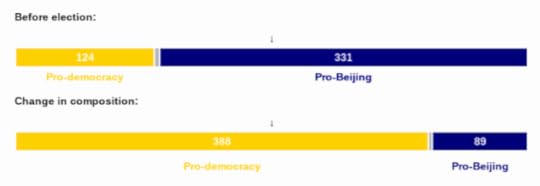 Source: WikipediaBeijing and their minions appear to have been caught entirely off guard. It would have been easy enough to call off these elections, citing the dangers posed by all the "rioters" (the elections, in fact, were entirely peaceful). But they never expected to suffer such a humiliating defeat. Maybe the Chinese Communist Party has actually started to believe its own propaganda. Maybe they expected a hitherto "silent majority" to come out and rally behind the government and the police.
Source: WikipediaBeijing and their minions appear to have been caught entirely off guard. It would have been easy enough to call off these elections, citing the dangers posed by all the "rioters" (the elections, in fact, were entirely peaceful). But they never expected to suffer such a humiliating defeat. Maybe the Chinese Communist Party has actually started to believe its own propaganda. Maybe they expected a hitherto "silent majority" to come out and rally behind the government and the police.They got a big surprise. It's difficult to predict what they will make of it.
Meanwhile, the protest goes on. We are watching history unfold.
Published on December 16, 2019 20:34
December 14, 2019
Saint John of the Cross

Juan de la Cruz died 428 years ago today, at the age of 49.
Like so many genuine reformers, he never imagined how great the fruit of his labors and sufferings would be for the whole Church. His entire focus was on following Jesus and being faithful to the mysterious transforming love of God.
Published on December 14, 2019 20:57
December 13, 2019
For Christmas: More Thoughts on Music, Creativity, and Media
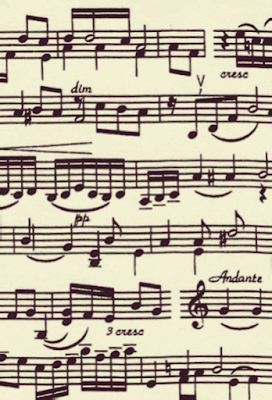 As the Christmas season approaches, people increasingly "fill their homes" with special music that helps them prepare for and celebrate the joy of Christ's birth and that stirs up the aspirations of human benevolence embodied in various family and cultural traditions of the season.
As the Christmas season approaches, people increasingly "fill their homes" with special music that helps them prepare for and celebrate the joy of Christ's birth and that stirs up the aspirations of human benevolence embodied in various family and cultural traditions of the season.I hope that this time of year (and other times too) allows us to experience music in its most intimate, personal form (wherein is also found its most powerful capacity to build bonds with others): SINGING - and in particular singing together. We should make the most of the upcoming opportunities to sing with our own voices (as best we can) in our churches and at other holiday gatherings. Singing together can be done with great simplicity, if we listen to one another even as we contribute our own vocal resonance. We give and receive within a multi-sensory communal experience that expresses a profound symbol of the whole dynamic of living-together in community.
So don't be shy. We all have music in our souls. Sing!
Of course, most of us use "Christmas music" that is prerecorded by professional singers and musicians. Today, we take for granted these ways of "playing music" on the radio, digital streaming, recordings, and even videos. There are many possibilities for enrichment in these media. But there is the danger that so much "thoughtless" access to "easy music" might render dull and superficial our musical sensibility. When music is exclusively defined and commodified as "entertainment," a cycle of degeneration ensues: listeners become less active appreciators and more passive spectacle-seekers, and artists tend to abandon their creative intuition in order to conform to the (profit-driven) constraints of making a fashionable and trendy (but more ephemeral) "show."
The banality of so much popular music has as much to do with our laziness as listeners as it does with the manipulative habits of a music "industry" dominated by superficial trends.
No doubt this has always more-or-less been true about music, humans being what they are. But the explosion of technological power has "expanded" the scope of everything that involves human interaction with the material world (some would say "overstretched," but I don't think this is always or necessarily the case — my ongoing analysis of these issues is outlined in other articles and posts). What is remarkable is that, in the midst of all the pressures, real musical creativity finds ways of prevailing and surprising us with new expressions of beauty.
If you've read this far, you might feel like you're being forced to overthink your favorite Christmas playlists or CDs. Haha, you should have known better!
Published on December 13, 2019 16:56
December 12, 2019
Nuestra Señora de Guadalupe
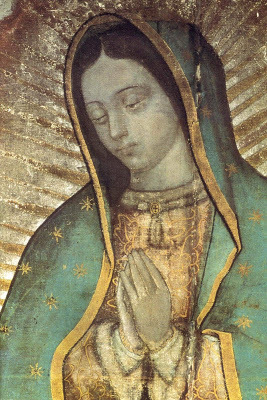 Today is the beautiful day, December 12, the 488th anniversary of the wonderful, inexplicable image appearing on the tilma of an indigenous Mexican man - an image intended to mediate the special, intimate presence of our loving and merciful Mother Mary.
Today is the beautiful day, December 12, the 488th anniversary of the wonderful, inexplicable image appearing on the tilma of an indigenous Mexican man - an image intended to mediate the special, intimate presence of our loving and merciful Mother Mary.Our Lady of Guadalupe is with us above all to draw us into her tenderness. She wants us to give her our burdens and sorrows and to listen to her so as to discover in a new way that each of us is loved, personally, intimately, by her Son Jesus.
Each one of us matters. Each one of us has a purpose. Above all, each one of us is the child of a good God who will not fail us in time of need.
Our Merciful Mother gives us Jesus her Son and our brother. And she knows and cherishes each of us as his brothers and sisters, as her own children, and she attends us with great compassion throughout our lives.
In Spanish / En Español:
Hoy es el hermoso día, el 12 de diciembre, el 488 aniversario de la maravillosa e inexplicable imagen que aparece en la tilma de un hombre indígena mexicano, una imagen destinada a mediar la presencia especial e íntima de nuestra amorosa y misericordiosa Madre María.
Nuestra Señora de Guadalupe está con nosotros sobre todo para atraernos a su ternura. Ella quiere que le demos nuestras cargas y penas y que la escuchemos para descubrir de una nueva manera que cada uno de nosotros es amado, personalmente, íntimamente, por su Hijo Jesús.
Cada uno de nosotros importa. Cada uno de nosotros tiene un propósito. Sobre todo, cada uno de nosotros es hijo de un Dios bueno que no nos fallará en tiempos de necesidad.
Nuestra Madre Misericordiosa nos da a Jesús su Hijo y nuestro hermano. Y ella nos conoce y valora a cada uno de nosotros como sus hermanos y hermanas, como sus propios hijos, y nos atiende con gran compasión durante toda nuestra vida.
Published on December 12, 2019 20:51
December 10, 2019
Christina Grimmie is a Bright Beautiful Light for the Future
 A decade is coming to an end in a few weeks.
A decade is coming to an end in a few weeks.For the last three and a half years, I have turned my attention nearly every month to remembering Christina Grimmie.
Again and again I find myself rediscovering her vitality, her creativity, her innocence and joy, her passionate dedication, her magnificent voice, her irrepressible music, her strength, vulnerability, humor, and gentleness, her greatness of soul — all these gifts of herself that she shared with people all over the world, that have left an indelible mark on the past ten years.
Christina's bright, innovative, resourceful personality reflects much that is good and promising in the younger generation who will be the protagonists of our future, the "kids" who grew up in the 2010s (among whom are my own son and four daughters). Her remarkable resilience has reminded me not to underestimate this generation.
I'm glad for that, because the path forward into the 2020s and beyond is far from obvious. The 2010s have been a traumatic decade. Communications technology has exploded in ways no one had previously imagined. This has engendered a wealth of new and interesting social media connections among millions of people and across vast distances. But the result can become a dizzying and often directionless interaction that only aggravates the deeper loneliness that people endure amidst a bewildering multiplication of superficial information and options for distraction. Meanwhile, the harshness of events and the proliferation of violence have too often shattered the foundations upon which people thought they stood in their relationships with one another. And so we find it harder to work together, to understand one another, to trust one another. Our families and our communities are more fragmented than ever.
Our awareness of our dignity and responsibility as human persons has not grown in proportion to our power to manipulate the material elements of the world. As a result, our capacity for destructiveness in earthly and human environments has become more ominous and threatening.
Still, when I look at the face and listen to the voice of Christina Grimmie, I find reasons for hope. This may appear ironic, given that her own life story can easily be interpreted as an illustration of the increasing danger and fragility of trying to live a generous and self-giving human life in today's world. I have written elsewhere why I don't think this is an adequate understanding of her story. At the center of her life was (is) a much greater Reality that remains a source of renewal in ways that are mysterious but also undeniably human.
Even though she will not accompany us into the next decade on the plane of earthly history, Christina is a seed sown deep into the life of our time and the experience of many representatives of the young generation. Her legacy is not only a foundation for the future, it will bear fruit in special ways, in new forms of maturity, responsibility, and open-heartedness among those who remember her and cherish the gift she has given of herself.
I am confident that she will be remembered and cherished by many, and discovered by many more in the years to come.

Published on December 10, 2019 20:46
December 9, 2019
Mary "Bumps" Juan Diego Off the Calendar This Year?
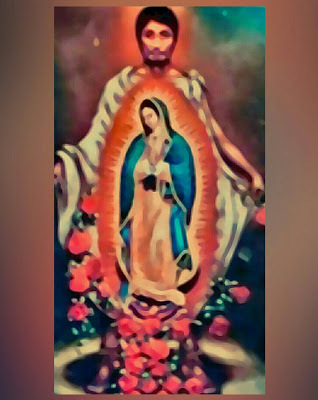 Hey, it's December 9... the day we honor Saint Juan Diego Cuauhtlatoatzin (his Nahua name - "Singing Eagle" - is pronounced, to the best of my knowledge, as "Kwat-LA-twat-zin").
Hey, it's December 9... the day we honor Saint Juan Diego Cuauhtlatoatzin (his Nahua name - "Singing Eagle" - is pronounced, to the best of my knowledge, as "Kwat-LA-twat-zin").Anyway, Happy Feast of... wait, what?
Ah well, at least in the USA, the Solemnity of the Immaculate Conception of the Blessed Virgin Mary was moved to today (because yesterday was the Second Sunday of Advent) but without the usual obligations [so don't panic, ok
Published on December 09, 2019 17:38



